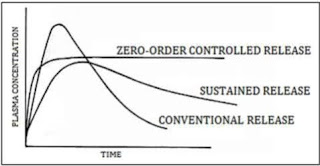Antibiotics
For More details
•
Mechanism of action of B-lactam antibiotics
1) Penicillins (Same MOA)
2) Cephalosporins
3) B-lactamase inhibitors (help to increase Penicillins
and Cephalosporins potency)
4) Monobactams (Almost same as Penicillin.)
All
B-lactam antibiotics are bactericidal which give their action by inhibiting the
syntheis of cell wall action which cause lysis of bacteria.
• How cell
wall formed --??
Cell
wall is made up with two components.
![]()
![]() Sugar backbones (glycone) + Peptide chain
Sugar backbones (glycone) + Peptide chain
![]()
![]() (monosaccharide) (short chain of amino acids)
(monosaccharide) (short chain of amino acids)
 |
NAG Peptidoglycon
NAM (highly porass)

Now,
All bacteria are hyper osmotic means they absorb water inside cytoplasmic
region. Due to this bacteria swell and they have a chance to burst, but cell
wall is strong and rigid which provide protection. against this.
Now,
when B-lactam antibiotics introduced into body they bind with Penicillin Binding proteins
(PRPs).
which
inhibits the action of enzymes (transpeptidas ) and inhibit the synthesis of cell wall.
which
causes the lysis and cell death of bacteria.
# PBPs vary in their affinity for binding penicillin or other
B-lactam antibiotics.
Penicillins
It is
the first antibiotic, which was first discovered and in reporte 1929 by Sir
Alexander fleming.

• All
penicillin composed of the
6-amino penicillinic acid nucleus with side
chain.
B-lactam ring Thiazolidine ring determines the antibacterial spectrum +
p'cological properties.
Commercial
production of biosynthetic penicillin depends on Penicillium notatum and Penicillium
Chrysogenum.
Semi-synthetic penicillin are widely used. because they are
revistance to stomach acid. so they can be taken orally and
also they have a digree of resistance to Penicillinase.
Penicillinase:A
penicillin-destroying enzyme which is produced by some bacteria.
Cephalosporins
These are the second major group of B-lactam
antibiotics because they also Contain B-lactam ring.
History
Cephalosporins were firstly isolated by Guiseppe
Brotzy in 1945 from the fungus Cephalosporium
acremonium which inhibited the growth of wide varities of gram-positive and
gram-negative bacteria.
He noticed that these cultures produced substance where
effective against salmonella typhi,
which cause typhoid fever.
Cephalosporins are closly related to the penicilling
in both structul and mode of action and are used to treat bacterial infections.
(identical moa)
Cephalosporins mostly obtained from Cephalosporin

Cephalosporins contain a B-lactam ring which is fused with 6-mumbered dihydrothiazine ring.

![]()
![]()
![]()

 Cephalosporins contain
7-aminocephalosporanic acid (7-ACA)
nucleus and side chain.
Cephalosporins contain
7-aminocephalosporanic acid (7-ACA)
nucleus and side chain.
B-lactam ring dihydrothiazine ring • affinity for PBP....
• resistance to locamasy..
Chemical
structure
1. Sulfonamides and related drugs: Sulfadiazine and others,
Sulfones Dapsone(DDS), Paraaminosalicylic acid (PAS).
2. Diaminopyrimidines: Trimethoprim, Pyrimethamine.
3. Quinolones: Nalidixic acid, Norfloxacin, Ciprofloxacin,
Prulifloxacin, etc.
4. β-Lactam antibiotics: Penicillins, Cephalosporins,
Monobactams, Carbapenems.
5. Tetracyclines: Oxytetracycline, Doxy-
cycline,
etc.
6. Nitrobenzene derivative: Chloramphenicol.
7. Aminoglycosides: Streptomycin, Gentamicin,
Amikacin, Neomycin, etc.
8. Macrolide antibiotics: Erythromycin,Clarithromycin,
Azithromycin, etc.
9. Lincosamide antibiotics: Lincomycin,Clindamycin.
10. Glycopeptide antibiotics: Vancomycin, Teicoplanin.
11. Oxazolidinone: Linezolid.
12. Polypeptide antibiotics: Polymyxin-B, Colistin,
Bacitracin, Tyrothricin.
13. Nitrofuran derivatives: Nitrofurantoin,Furazolidone.
14. Nitroimidazoles: Metronidazole, Tinidazole, etc.
15. Nicotinic acid derivatives: Isoniazid, Pyrazinamide,
Ethionamide.
16. Polyene antibiotics: Nystatin, Amphotericin-B,
Hamycin.
17. Azole derivatives: Miconazole, Clotrimazole,
Ketoconazole, Fluconazole.
18. Others: Rifampin, Spectinomycin, Sod.fusidate,
Cycloserine, Viomycin, Ethambutol, Thiacetazone, Clofazimine, Griseofulvin.
B.
Mechanism of action
1. Inhibit cell wall synthesis: Penicillins, Cephalosporins,
Cycloserine, Vancomycin,Bacitracin.
2. Cause leakage from cell membranes:Polypeptides Polymyxins,
Colistin, Bacitracin. Polyenes Amphotericin B, Nystatin, Hamycin.
3. Inhibit protein synthesis: Tetracyclines,
Chloramphenicol, Erythromycin, Clindamycin, Linezolid.
4. Cause misreading of m-RNA code and affect
permeability:
Aminoglycosides,Streptomycin, Gentamicin, etc.
আমাদের ওয়েব সাইটে আপনিও লিখতে পারেন।জ্ঞানকে
ছড়িয়ে দিন সকলের মাঝে।



Comments
Post a Comment
Thanks